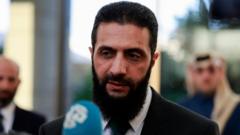In a revealing interview with Saudi state broadcaster Al Arabiya, Ahmed al-Sharaa, leader of the rebel group Hayat Tahrir al-Sham (HTS), projected that Syria might take up to four years to hold new elections following the removal of former President Bashar al-Assad. This statement marks the first time Sharaa has ventured a timeline regarding the future electoral process since HTS's recent gains. He noted that drafting a new constitution could demand up to three years, with tangible improvements in public services potentially being a year away.
Sharaa emphasized the necessity of rebuilding Syria’s legal framework to ensure legitimate elections, highlighting the need for a comprehensive national census. He acknowledged his group’s complex legacy, which has shifted from its earlier ties to jihadist factions like Al-Qaeda and ISIS, as HTS prepares to transition under a redefined governance model. The rebel leader insinuated that his group would be "dissolved" during an upcoming national dialogue conference, which he suggested would be pivotal for uniting the multi-ethnic nation after over a decade of devastating civil war.
Responding to criticism surrounding his transitional government's appointments, Sharaa stated these decisions were crucial for inclusivity rather than exclusion. He affirmed a commitment to safeguarding the rights of Syria’s diverse ethnic and religious communities, which include Kurds, Christians, Druze, and others amidst a dominant Arab Sunni majority.
While discussions on governance unfold, the ongoing crackdown on Assad loyalists has surged, with reports of approximately 300 arrests happening in collaboration with local populations. Rami Abdel Rahman, head of the Syrian Observatory for Human Rights, indicated that those detained included pro-regime informants and former soldiers, a matter compounded by the seizure of weapons and ammunition in targeted operations against Assad's militia.
As Syria navigates its potential future, the upcoming dialogue conference will be closely watched, signaling whether the new leadership can foster unity and progress in a country long fractured by conflict.



















